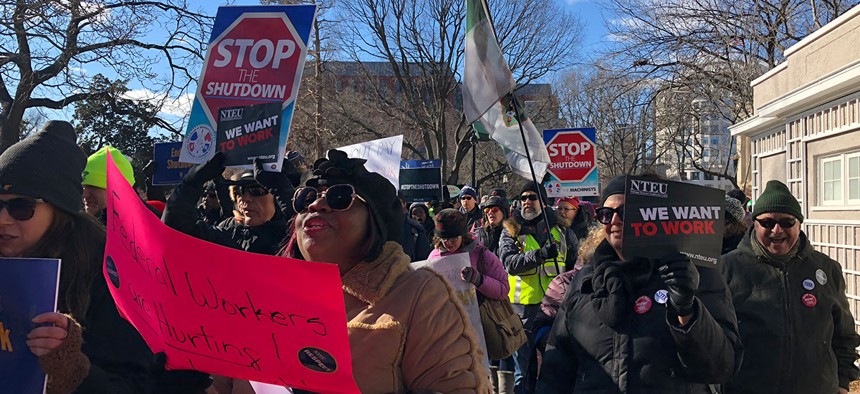
Erich Wagner/GovExec.com
Federal Unions Decry Government 'Lock Out' At Rally
Democratic lawmakers, federal workers demand a swift end to the partial government shutdown on its 20th day.
On the eve of the day that most federal workers will miss paychecks for the first time since the start of the partial government shutdown, union officials, Democratic lawmakers and impacted workers marched to the White House to demand a swift end to what they repeatedly called a “lock out.”
“We keep saying it’s a shutdown, but it’s probably more accurate to call it a lock out,” said Richard Trumka, president of the AFL-CIO, which hosted the rally Thursday at its Washington headquarters. “Hard working American patriots are being locked out of their jobs for no other reason than the politics of fear.”
At least 1,000 federal workers and supporters came out on a cold and windy day in D.C. to demand President Trump agree to reopen the government or, failing that, Senate Majority Leader Mitch McConnell agree to hold a vote on a House-passed measure to fund all federal agencies except the Homeland Security Department for the rest of the fiscal year. Homeland Security would be funded until Feb. 8.
Sen. Chris Van Hollen, D-Md., recounted the story of one of his constituents, who is struggling to pay her bills as a result of the shutdown.
“A mother in Maryland had to set up a GoFundMe to help pay for college tuition for her son,” Van Hollen said. “When tomorrow comes, she won’t get a paycheck, and she has to pay the tuition on a monthly installment basis.”
Patricia Herbert, a 30-year Internal Revenue Service employee, told Government Executive that the shutdown is having a profound impact on her finances and health.
“I have multiple sclerosis, and I’m on a monthly injection called Copaxone, which is a $50 copay,” she said. “I haven’t paid for that this month, and I can’t get my inhaler for asthma, because I can’t afford to get them. I haven’t paid my mortgage, and my lender won’t [show leeway], and I’m still trying to get the money together for my car note . . . My neurologist has been really pushing me to get my injection for this month, and I’m worried I may have an episode, but I just don’t have the money.”
Mark Pellerito, a member of the National Weather Service Employees Organization who has been working without pay since the shutdown began, recounted the impact that the uncertainty has had on one of his coworkers in particular.
“Our newest employee has been here for less than a year, and doesn’t have a lot of money saved up yet,” he said. “She had a seizure after starting work, and then another, and both required ambulances, hospital visits, diagnoses and tests, and that all means medical bills. Medical bills that are now due, and they don’t take IOU’s. But she is going to work every day for no pay, and there’s a possibility she could have another seizure because of high stress situations.”
Talten Hall is a member of the National Treasury Employees Union and a furloughed gardener with the National Park Service, working at Lafayette Park and the Ellipse outside of the White House.
“I love my job. I love planting flowers and pulling weeds and making sure everything looks good,” Hall said. “But right now, I’m hurting financially. I count on each and every pay check to pay my bills, and now I worry about a roof over my head and food on my table every day. It’s not fair.”
Jamie Rodny, a National Federation of Federal Employees member and an investigator at the Housing and Urban Development Department’s Office of Fair Housing and Equal Opportunity, stressed although it is important that federal workers be provided financial certainty, the shutdown is also affecting millions of people who rely on services provided by the unfunded agencies.
“If the shutdown continues, HUD rental assistance payments won’t go through,” Rodny said. “Millions rely on us, federal government employees, to help them and to help them survive in America. End this shutdown now.”
Sign up for GovExec newsletters and alerts and download our app to stay informed.







